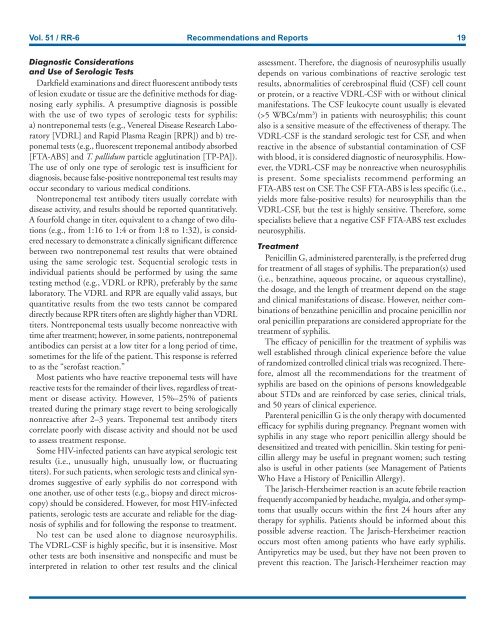You also want an ePaper? Increase the reach of your titles
YUMPU automatically turns print PDFs into web optimized ePapers that Google loves.
Vol. 51 / RR-6 Recommendations and Reports 19<br />
Diagnostic Considerations<br />
and Use of Serologic Tests<br />
Darkfield examinations and direct fluorescent antibody tests<br />
of lesion exudate or tissue are the definitive methods for diagnosing<br />
early syphilis. A presumptive diagnosis is possible<br />
with the use of two types of serologic tests for syphilis:<br />
a) nontreponemal tests (e.g., Venereal Disease Research Laboratory<br />
[VDRL] and Rapid Plasma Reagin [RPR]) and b) treponemal<br />
tests (e.g., fluorescent treponemal antibody absorbed<br />
[FTA-ABS] and T. pallidum particle agglutination [TP-PA]).<br />
The use of o<strong>nl</strong>y one type of serologic test is insufficient for<br />
diagnosis, because false-positive nontreponemal test results may<br />
occur secondary to various medical conditions.<br />
Nontreponemal test antibody titers usually correlate with<br />
disease activity, and results should be reported quantitatively.<br />
A fourfold change in titer, equivalent to a change of two dilutions<br />
(e.g., from 1:16 to 1:4 or from 1:8 to 1:32), is considered<br />
necessary to demonstrate a clinically significant difference<br />
between two nontreponemal test results that were obtained<br />
using the same serologic test. Sequential serologic tests in<br />
individual patients should be performed by using the same<br />
testing method (e.g., VDRL or RPR), preferably by the same<br />
laboratory. The VDRL and RPR are equally valid assays, but<br />
quantitative results from the two tests cannot be compared<br />
directly because RPR titers often are slightly higher than VDRL<br />
titers. Nontreponemal tests usually become nonreactive with<br />
time after treatment; however, in some patients, nontreponemal<br />
antibodies can persist at a low titer for a long period of time,<br />
sometimes for the life of the patient. This response is referred<br />
to as the “serofast reaction.”<br />
Most patients who have reactive treponemal tests will have<br />
reactive tests for the remainder of their lives, regardless of treatment<br />
or disease activity. However, 15%–25% of patients<br />
treated during the primary stage revert to being serologically<br />
nonreactive after 2–3 years. Treponemal test antibody titers<br />
correlate poorly with disease activity and should not be used<br />
to assess treatment response.<br />
Some HIV-infected patients can have atypical serologic test<br />
results (i.e., unusually high, unusually low, or fluctuating<br />
titers). For such patients, when serologic tests and clinical syndromes<br />
suggestive of early syphilis do not correspond with<br />
one another, use of other tests (e.g., biopsy and direct microscopy)<br />
should be considered. However, for most HIV-infected<br />
patients, serologic tests are accurate and reliable for the diagnosis<br />
of syphilis and for following the response to treatment.<br />
No test can be used alone to diagnose neurosyphilis.<br />
The VDRL-CSF is highly specific, but it is insensitive. Most<br />
other tests are both insensitive and nonspecific and must be<br />
interpreted in relation to other test results and the clinical<br />
assessment. Therefore, the diagnosis of neurosyphilis usually<br />
depends on various combinations of reactive serologic test<br />
results, abnormalities of cerebrospinal fluid (CSF) cell count<br />
or protein, or a reactive VDRL-CSF with or without clinical<br />
manifestations. The CSF leukocyte count usually is elevated<br />
(>5 WBCs/mm 3 ) in patients with neurosyphilis; this count<br />
also is a sensitive measure of the effectiveness of therapy. The<br />
VDRL-CSF is the standard serologic test for CSF, and when<br />
reactive in the absence of substantial contamination of CSF<br />
with blood, it is considered diagnostic of neurosyphilis. However,<br />
the VDRL-CSF may be nonreactive when neurosyphilis<br />
is present. Some specialists recommend performing an<br />
FTA-ABS test on CSF. The CSF FTA-ABS is less specific (i.e.,<br />
yields more false-positive results) for neurosyphilis than the<br />
VDRL-CSF, but the test is highly sensitive. Therefore, some<br />
specialists believe that a negative CSF FTA-ABS test excludes<br />
neurosyphilis.<br />
Treatment<br />
Penicillin G, administered parenterally, is the preferred drug<br />
for treatment of all stages of syphilis. The preparation(s) used<br />
(i.e., benzathine, aqueous procaine, or aqueous crystalline),<br />
the dosage, and the length of treatment depend on the stage<br />
and clinical manifestations of disease. However, neither combinations<br />
of benzathine penicillin and procaine penicillin nor<br />
oral penicillin preparations are considered appropriate for the<br />
treatment of syphilis.<br />
The efficacy of penicillin for the treatment of syphilis was<br />
well established through clinical experience before the value<br />
of randomized controlled clinical trials was recognized. Therefore,<br />
almost all the recommendations for the treatment of<br />
syphilis are based on the opinions of persons knowledgeable<br />
about STDs and are reinforced by case series, clinical trials,<br />
and 50 years of clinical experience.<br />
Parenteral penicillin G is the o<strong>nl</strong>y therapy with documented<br />
efficacy for syphilis during pregnancy. Pregnant women with<br />
syphilis in any stage who report penicillin allergy should be<br />
desensitized and treated with penicillin. Skin testing for penicillin<br />
allergy may be useful in pregnant women; such testing<br />
also is useful in other patients (see Management of Patients<br />
Who Have a History of Penicillin Allergy).<br />
The Jarisch-Herxheimer reaction is an acute febrile reaction<br />
frequently accompanied by headache, myalgia, and other symptoms<br />
that usually occurs within the first 24 hours after any<br />
therapy for syphilis. Patients should be informed about this<br />
possible adverse reaction. The Jarisch-Herxheimer reaction<br />
occurs most often among patients who have early syphilis.<br />
Antipyretics may be used, but they have not been proven to<br />
prevent this reaction. The Jarisch-Herxheimer reaction may


